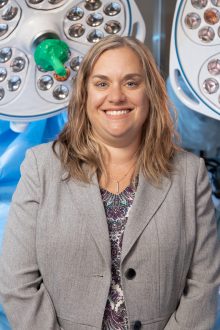

September 16, 2019 | By Adrianne Bowen, MD, MBA, FACS
Certain individuals are at a higher risk for development of breast cancer than others. How do you know if you are one of them? And what can you do to lower your risk?
There are certain lifestyle modifications that increase your risk of breast cancer, including use of alcohol, smoking, not having children, being overweight or obese after menopause, and taking hormone replacement therapy after menopause. In addition, both breast feeding and regular physical exercise seem to decrease your risk for developing breast cancer. Many of these factors are within your control.
There are certain conditions not within our control, however, that also contribute to an increased risk of breast cancer. Simply being a woman and advancing age are the two largest factors over which we obviously have no influence. In addition, a family history of breast cancer increases your risk, as does any previous personal history of breast cancer. Finally, the presence of dense breast tissue noted on a mammogram can increase your risk as well. Overall, Caucasian women are more likely to develop breast cancer, but in women under the age of 45, breast cancer is more common in African-American women.
Certain benign breast conditions can put you at a higher risk for breast cancer, especially atypical ductal or lobular hyperplasia. In these conditions, cells grow excessively and often start to appear abnormal. Other risk factors include a young age at first menses (before age 13), as well as later menopause, in addition to radiation therapy to the chest or exposure to diethylstilbestrol (DES), an estrogen-like drug used to prevent miscarriages.
Breast cancer risk can also be inherited. Mutated versions of genes can lead to abnormal cell growth, which can lead to cancer. The most common of these genes are BRCA1 and BRCA2, but there are more than 20 genes that have varying effects on breast cancer risk. While genetic testing can identify possible gene mutations in many cases, there are limits to this technology and our understanding of what these gene mutations mean.
The surgeons at Specialists in General Surgery can help you determine your risk of breast cancer and provide counseling and management if you are at high risk. Please give us a call.